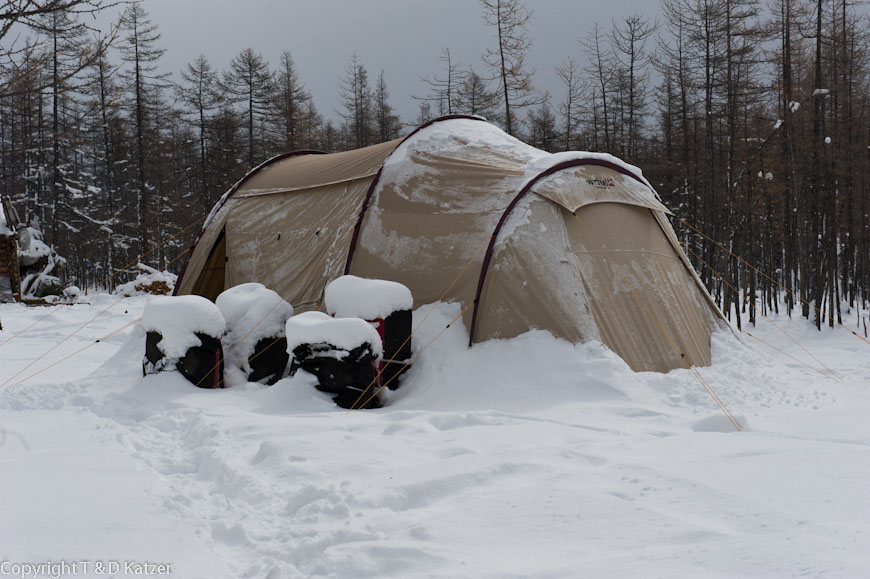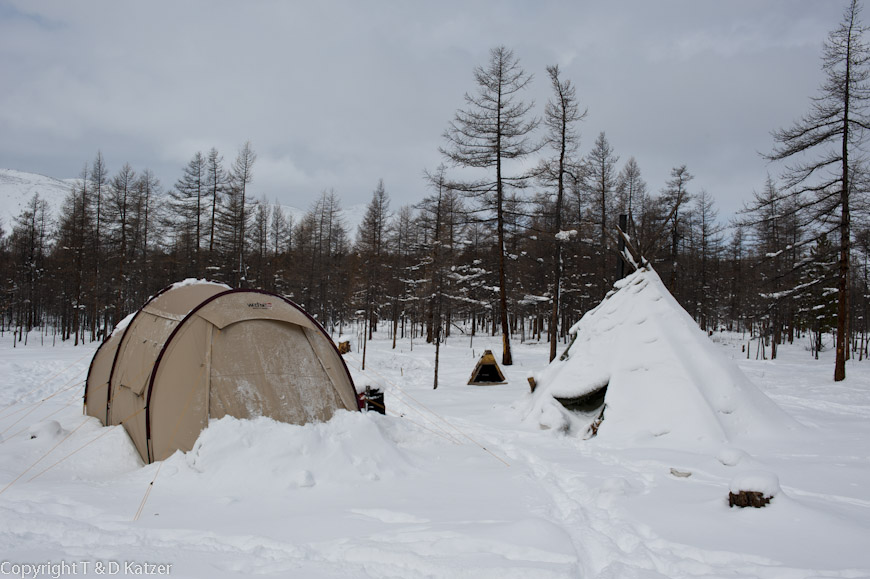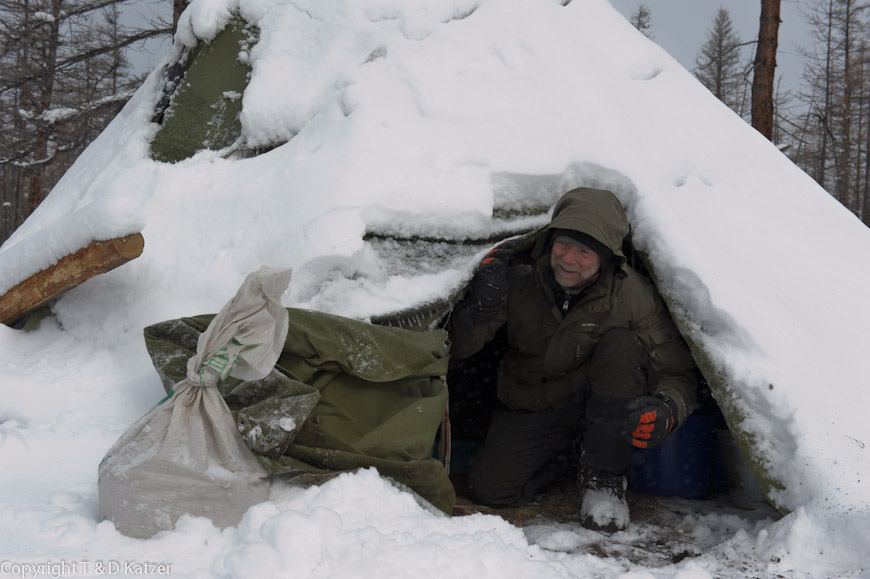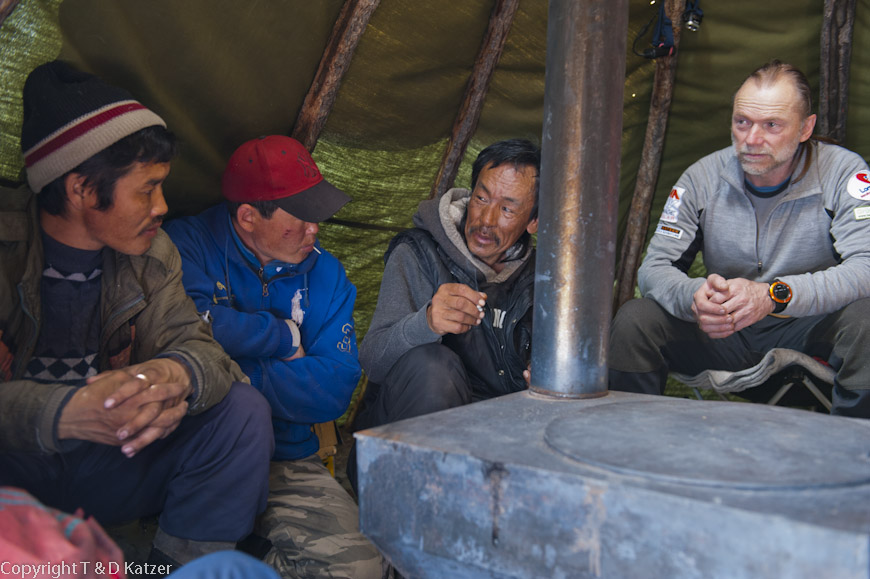
Massive snowfall – Epileptic seizure
N 51°33'337'' E 099°15'341''
Day: 270-272
Sunrise:
06:17/06:13
Sunset:
20:26/20:29
Total kilometers:
1341
Soil condition:
Ice, snow
Temperature – Day (maximum):
0°C
Temperature – day (minimum):
minus 5°C
Temperature – Night:
minus 8°C
Latitude:
51°33’337”
Longitude:
099°15’341”
Maximum height:
1981 m above sea level






When we wake up today, there is a ten-centimeter-thick layer of snow on our tent. “They won’t set off today in this awful weather either,” Tanja says again. “That’s quite possible. Then I’ll unpack the rest of the equipment too. At least what we urgently need,” I reply. In the morning, the Tuwa actually decide to wait for better weather. “There’s no point riding off in this snowfall. All our belongings get soaked by the wet snow. Last year, a blizzard hit us shortly after we loaded the reindeer. We rode anyway. When we arrived at the spring camp, everything was soaked with water. We couldn’t set up our tipis because of all the snow. We had to wait three days until the snow melted away to some extent and we were able to erect our tipis on wet ground. We want to avoid that this time,” explains Ultsan. “But what do you do when your reindeer have babies?” I ask. “Then we have to carry them.” “You carry your baby reindeer?” “Yes. We put them in our Deel and transport them that way.” “That’s a lot of work?” “Yes. If we’re unlucky, we often have to ride back and forth. Until the equipment and young animals are at the spring camp. We can only hope that the weather improves,” he concludes.
Bilgee comes riding back from the outdoor camp and visits us in the tipi. We explain the new postponement to him. “This time because of bad weather,” says Tanja. Bilgee shakes his head again, but takes it with Mongolian composure. At 16:00, Sansar and Ultsan’s brother Hoo, who was recently hospitalized for severe alcohol poisoning, bring the horses. “The mounts are here now, but the weather is bad. I hope we can get out of here at some point,” I say, lost in thought.
In the evening we hear that the weather forecast has predicted heavy snowfall and wind for another eight days. It actually snows all night, more than the entire winter. It takes a lot of effort to free the large tent and our tipi from the heavy white mass. As it has thawed during the day so far, I have to shovel away all the snow around the tent and tipi with my foot and a bucket. Hope to save our sleeping place from a meltwater lake this way. The first baby reindeer is also born today. A happy occasion for the tribe members and at the same time a reminder to use every conceivable opportunity for the parade. Tanja visits the new arrival who is lying huddled in the fresh, high snow. “He’s really cute Denis. You absolutely have to see it,” she says enthusiastically.
Epileptic seizure
There is at least 20 centimeters of snow this morning. Ultsan and Sansar use the waiting time to go hunting for gazelles. They leave good tracks in the fresh snow and are easier to track down. Twenty-year-old Huchee also wants to join them. However, he is not allowed to accompany them. “Why not?” I ask. “He’s a danger to the hunters,” Tsaya explains. “A danger?” I ask in surprise. “Yes. He came back from Tsagaan Nuur two days ago. He got completely drunk there and got into a fight with someone in his drunken stupor. Didn’t you notice his black eye?” “Oh, yes. You can’t miss it. But why don’t they take him hunting? It can’t be the vodka consumption, can it? Everyone here drinks when they can and the poor guy wants to get out and experience something,” I object. “Well, he hung around my hut for a long time after he left. He has nothing to eat and his family didn’t leave him anything either. So the good-for-nothing goes from family to family to eat his way through.” “Why good-for-nothing?” I interrupt her. Oh, his family is currently building a log cabin in Tsagaan Nuur. They have their hands full and need him, of course. But he just left his family without saying a word to get back to the taiga. He doesn’t have to do anything, he can just get on everyone’s nerves a bit and let all four of them go.” “Sounds like you don’t like him very much?” “What can I say. Before he joined the army he was a nice helpful young man. When he came back he was a drunkard. The army made him that way. It wasn’t good for him.” “Here in Germany, too, some young men come back from the army as alcoholics. That’s sad. But you wanted to tell me why nobody wants him on the hunt anymore.” “Oh yes. Well, I was cooking when he fell off the bed and lay on the floor. I thought it was the aftermath of the booze and didn’t pay him any more attention. But then I noticed that he was twitching uncontrollably. Oops! Oops! What’s wrong with you? I shouted and jumped to help him. He was vomiting blood, which men often do when they drink on an empty stomach. But Huchee was different. He wasn’t conscious. Don’t do this to me! I shouted, because I thought he would die here in my baishin. Ultsan was with the reindeer and couldn’t help me. So I poured a cup of cold water over his face. But it didn’t help and his body suffered from severe cramps. I shook him and patted his face. Suddenly he opened his eyes. What’s wrong with you? I asked him. “What’s wrong?” he replied and sat back down on the bed. “Don’t you know what just happened? You fell off the bed and your whole body was convulsing and twitching like a fish on a line.” “No, I didn’t notice anything. But I get that a lot in spring,” he said, wiping the blood from the corners of his mouth. “Jeez Huchee. You almost died here and you’re acting like nothing happened?” “Oh, that’s not so bad,” he said, “which is why I called his mother in Tsagaan Nuur.” “Give him a few cups of tea. Then he’ll be fine,” she said succinctly.” “The poor guy is most likely suffering from epilepsy. That’s certainly not safe for a hunter in the taiga,” I ponder. “That’s exactly why no one wants to go hunting with him. He endangers himself and his companions.” “That means he goes alone?” I ask, because I can’t imagine Huchee staying in camp for that reason. “Exactly. He took three reindeer and followed Ultsan and Sansar.”
I go back to our tipi to tell Tanja about the further postponement. “Maybe we’ll stay here until the end of May?” she says. “Maybe. Then the early camp is a thing of the past,” I reply. “What the hell. Then our Naraa can have her baby here and when she and her child are strong enough, we’ll ride from here to Tsagaan Nuur.” “Don’t think it will snow forever. And when the snow is gone we won’t have any drinking water.” “Then we’ll get water from the lake.” “It’s ten kilometers from here. That’s too much effort.” “Well, at some point the bad weather will stop and then we’ll all move together,” she says cheerfully. “It’s dripping,” I mean. “How does it drip?” “Well, look at the canvas. The condensation is running through there,” I say, pointing to the skin of the tipi. “Oh dear. That doesn’t look good,” says Tanja and moves her food box a little to the side. “Gamba told me that the canvas is of poor quality. They have real problems with it in heavy rain,” I explain. “It’s probably made in China. Right?” “Where else,” I reply and go on to explain that Chinese tent fabric costs 1,500 tugriks (€0.86) per square meter and the waterproof Russian fabric costs 4,000 tugriks (€2.28) per square meter. “The Tuwa need 70 square meters for a tipi. They can’t afford the better quality.”
While the tribe members pass the time with Ultsan’s stone drill by repeatedly starting it up to maltreat some of the boulders lying around or even build a snowman, we sit in our tipi and cook Bortsog. I try to write a few lines or knead dough for a fresh loaf of bread. In the evening, nasty clouds gather and a strong wind blows over our camp. It doesn’t take long before they open their gates and shower us with more huge masses of snow. It snows all night without interruption so that I have difficulty getting out of the tent the next morning. “30 centimeters!” I shout. “What?” Tanja’s voice comes through the canvas. “It’s snowed at least 30 centimetres. We’re certainly not leaving!” “Good, then I’ll stay in bed a little longer,” it replies as usual.
I spend three hours freeing our tents from the white load. Then I crawl into our tepee on all fours and light a fire in the stove. “What a fucking mess. This fucking bait!” I shout angrily. “What?” Tanja’s question echoes through the canvas to me in the tipi. “Those stupid dogs were in here and made a huge mess!” I reply. “Oh no! Is something missing? Have they eaten something?” asks Tanja, startled. “Could be. In any case, there are unwashed paw prints on the table and the big bucket of melted water has fallen over. It looks like the vandals have been at it,” I reply and try to survey the damage. When Tanja finally gets up, she realizes that a bag containing an expensive folding knife, a bar of soap, a spoon and fork and other small items are missing. Since a dog stole a small plastic bucket with food for Mogi from Bilgee’s tent only a few days ago, we know that the dogs are specialized in stealing containers of all kinds, in order to bite them open somewhere in the forest undisturbed to get to the contents. “Didn’t know you liked soap?” says Tanja. “The guy probably needed a wash,” I reply. “Exactly. And if we see a dog foaming at the mouth, we know who the thief was,” she replies with a laugh.
Today, as always, we have lots of visitors. As we ran out of dried milk weeks ago, Tanja serves black coffee or tea with sugar. Bilgee and I reassemble the chainsaw, which I had already dismantled and packed for the move. We fetch logs from the forest with boron, which is ideal for the job because of its calmness and experience as a cart horse. Then we cut the logs together with the chainsaw and chop firewood. As I clear the firewood supply in the tepee, Bilgee says; “I would like to ride to Tsagaan Nuur tomorrow. I need to transfer my first month’s salary to my family, buy a few things before we move to the spring camp and we really need a tick vaccine for the horses. This is very important because they are not the strongest,” he says. “Tomorrow? To Tsagaan Nuur? And what if the Tuwa leave tomorrow? We have to be there because we don’t know where the camp is,” I reply. “The weather will be bad tomorrow too. They certainly won’t set off. Besides, I’ll ride there early and be back at night,” he explains. “That’s at least 60 kilometers of violent riding. Can our horses manage that?” “Certainly. They’ve been able to rest for almost a month now. They may be thin, but they’ll make it.” “Hmmm,” I think about it and ask Tanja what she thinks. “I’ll ride with you.” “What, you want to ride along?” “Yes, why not? I like riding. We also need some things. I can bring our parcels that our family sent us. They have now arrived at Tsendmaa and Ayush. I’ll bring you the deel so that you don’t have to freeze in the tepee all the time and our rubber boots that Saraa has also sent to Tsagaan Nuur in the meantime. The opportunity is good. If Bilgee goes, I’ll go with him. You don’t mind, do you?” “Me? No. But it’s a long ride.” “Don’t you trust me to do that?” “Ha, ha, ha. Of course I wouldn’t put it past you. You’ve done other rides and trips in your life. If you think you can do it, you will,” I reply confidently and would love to be there too, as the constant back and forth about the move is starting to get on my nerves. “Would be a good change, but someone has to stay and keep the stupid dog thieves at bay,” I say. Bilgee immediately has another plan ready. “We set off at 9:00 a.m. and go with four horses. We ride out on two and back on the others. So none of them will be exhausted. Once we’re out of the forest, we’ll be trotting most of the way. If everything goes well, we’ll be there in three hours. We organize what we have to organize and ride back in the afternoon. That shouldn’t be a particular challenge.” “Well then, that’s a done deal,” I decide, while Tanja is already packing the essentials for her trip tomorrow.
Before we leave the tipi again in the evening to sleep in our cold tent, I stand in front of the temporary entrance to our tipi for a while and think about how I can stop the dogs from getting in. Then I tie the right end of the door rope to a wooden beam, attach another beam to the lower end and lay some boards against it. “That should do it,” I say to myself, satisfied, and walk through the thick snow into our tent. “Bare survival out here still requires a lot of energy,” I say as I groan and lie down on my sleeping mat, crawl into my sleeping bag and put my hot water bottle on my cold feet. “That’s right. We’re busy all day long. Especially since we’ve been living in this tipi, the work has become even busier. There’s always something wrong. One day the wind blows away the canvas, which you thankfully managed to fix, then dogs break in and steal cutlery, knives and soap, fetching and chopping wood, making a fire, cooking, fetching and melting snow, boiling water, baking bread, writing down your notes, archiving pictures, constantly repairing something, etc.” Tanja lists. “Not to mention the constant packing and unpacking,” I add. “Well. You definitely don’t get fat here in the taiga,” she says, also moaning softly. “Unless you eat as much as our Tsaya.” “Why? Does she eat a lot?” “Haven’t you noticed that yet? She eats incessantly. That kind of excess weight needs to be fed,” I say quietly. “That’s right. Now that you mention it. She actually chews something all the time.” “Yes, she does. In any case, she’s long forgotten my dietary suggestions. But what the hell. That’s her problem. Apart from that, I can understand her. I’m hungry all the time too and could eat all the time,” I say, pulling my hot water bottle from my now heated feet to my cold knees.
We look forward to your comments!

